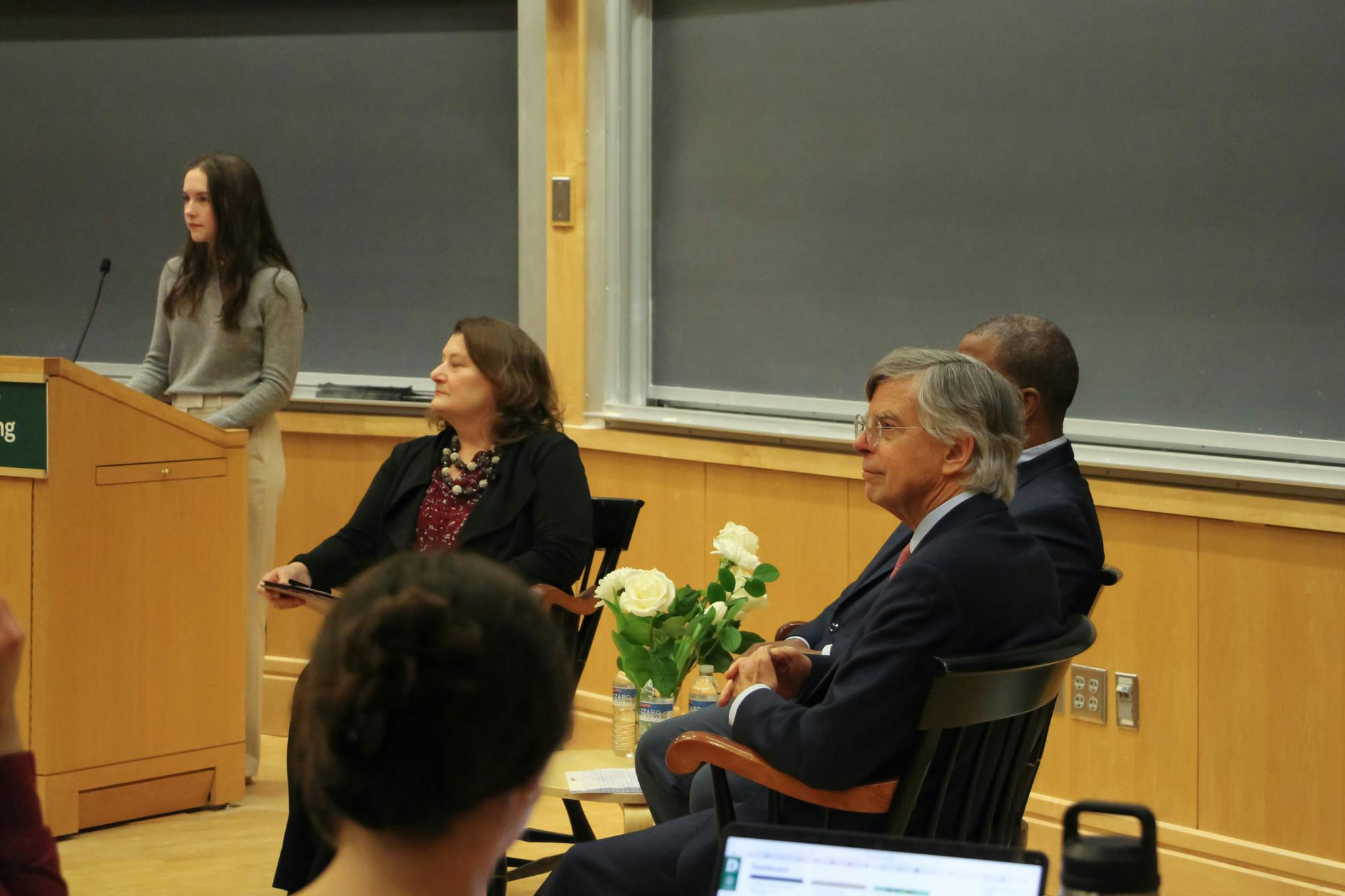On Feb. 22, the John Sloan Dickey Center for International Understanding and the Dartmouth chapter of the Alexander Hamilton Society hosted a discussion on the state of the Russia-Ukraine war. The event featured the Dickey Center’s Magro Family Distinguished Fellow in International Affairs Spencer Boyer and former U.S. Ambassador to Ukraine William Taylor. The event was moderated by Dickey Center director Victoria Holt.
The event was open to the public and aimed to address the state of the conflict two years after the Russian invasion of Ukraine, which took place on Feb. 24, 2022.
To begin the discussion, Holt asked Taylor and Boyer about the tensions leading up to the invasion in 2022.
“In January of 2022, I happened to be in Kyiv,” Taylor said. “Our intelligence had figured out that it was very likely for Russia to invade. The Ukrainians did not want to believe it. The Germans didn’t believe it.”
Boyer, who has been involved with the intelligence community since 2014, encountered much of this information firsthand through his position as former Deputy Assistant Secretary of Defense for European & NATO Policy, during which he worked with the National Intelligence Officer of Europe and the National Intelligence Council.
“Right up until the time of the invasion, there were some allies and partners that didn’t really want to believe it,” Boyer added. “It felt too irrational. There was no way Putin would do this.”
The conversation then turned to a discussion on Ukraine’s response to the invasion.
“I think a lot of people assumed [Ukraine] could not stand up to this massive, crushing force,” Holt said.
Boyer said that he thinks that Americans “underestimated Ukrainians’ will to fight.”
“Tell anyone that there would be a panel here two years from today about the state of the war, and no one would have believed you,” he added.
Holt then turned the discussion to other European nations and Ukraine’s allies. Boyer said that Europe has done a lot to support Ukraine since the start of the war, including providing “military, humanitarian and financial assistance.”
“Is there more to do, and can we continue to push our allies to get more done?” Holt asked. “Yes, but I think they’ve shown themselves incredibly worthy allies.”
Taylor added that European nations have looked towards the United States for leadership during the conflict.
“We led on [imposing] sanctions; the Europeans followed,” he said. “We led on providing weapons; the Europeans joined in.”
Additionally, the panel discussed the benefits of the U.S. aiding Ukraine in the war.
“I have been in conversations where someone has said to me, ‘Why should we care about Ukraine?’” Holt said. “What does [the war] have to do with American interests?”
Taylor noted that the United States must think about the influence of the war on our “foreign relations system” as a whole.
“If Russia can get away with taking a part of their neighboring country, then that’s a different world than we want to live in,” he said.
Additionally, Boyer pointed out that the war had potential implications for tensions between China and Taiwan, asking “Is China watching?”
“I believe what happens in Ukraine will affect their decision-making, particularly in relation to Taiwan,” Boyer said.
The discussion ended with a conversation about what the panel foresees for the future of Ukrainian and Russian relations.
Taylor said he sees the war playing out in one of three ways. The first, he described as a “stalemate scenario” where neither side can “break through.” The second way involves the U.S. and Europe “providing Ukraine with sufficient support” to win the war. Regarding the third outcome, Russian victory, he said, “Then, they will be on the border with NATO, and our soldiers will be there.”
Boyer added that the results of the U.S. presidential election in November will have a major impact on whether the U.S. will support Ukraine.
“[Former President Donald] Trump has said he will end this conflict on day one if he wins, which is hard to imagine meaning anything else but cutting a deal with Vladimir Putin,” he said.
To end the event, the discussion was opened to the audience for questions.
One audience member asked the panel if there is a possibility of Russia turning to nuclear weapons if they believe themselves to be losing the war. Taylor responded that “the chances are low,” as he believes the Chinese government would have cautioned Russia against the possibility. He added that the threat of U.S. retaliation would also discourage the use of nuclear weapons.
Another audience member asked about the possibility of the U.S. sending soldiers into Ukraine.
“President Biden has made it clear that this is a fight between Ukraine and Russia,” Taylor said. “I think the chances are very low.”




